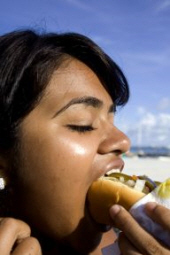 Emotional health appears to be clearly where the major development of anorexia nervosa lies. It is because of their emotional health that brings them to this point in the beginning and because of their emotional health that keeps it going. It is a very real sickness that involves their obsessive thoughts of being thin, low self-esteem issues and control.
Emotional health appears to be clearly where the major development of anorexia nervosa lies. It is because of their emotional health that brings them to this point in the beginning and because of their emotional health that keeps it going. It is a very real sickness that involves their obsessive thoughts of being thin, low self-esteem issues and control.
A person with anorexia nervosa looks in the mirror and sees big, chunky thighs and a thick middle. They see themselves as a fat person even though they may be of average weight or below average weight. This distorted self-image, or ability to see themselves realistically, is the root of anorexia.
They become obsessive about their food. They count out each morsel that goes into their mouths. They say they are not hungry and convince even themselves that they are not even though they may literally be starving. They may want to eat, but they cannot for fear of being fat.
People with anorexia also obsess over exercise and in their mind a certain amount must be done each day. They use exercise to control calorie burn and weight. But because they also know that they may not fit the stereotypical body image of a person, they often exercise at home so they don’t have to go to a gym.
The person with anorexia nervosa may be an obsessive “weigher”. They feel in control as the numbers on the bathroom scale plummet. Getting on the scale several times a day will often give them the positive reinforcement that the numbers are approaching their ideal – which is well below normal body weight.
A person who suffers from anorexia nervosa will restrict their caloric intake more and more and will be obsessive in working off that one french fry or that one gum drop. Every bit of food that they put into themselves becomes a fear, a cause of concern, and a major worry to them.
 In some cases this emotional disorder originates from feelings of lack of control in their lives. This is one aspect that they can control and no one can really stop them.
In some cases this emotional disorder originates from feelings of lack of control in their lives. This is one aspect that they can control and no one can really stop them.
A person with anorexia nervosa has a medical and psychological disorder. They need care for both aspects of this disorder to undergo a healing process.
The psychological aspect of treatment will involve counseling and may or may not involve the use of medications. People suffering from anorexia must learn to see themselves as they really are – have a realistic body image about themselves. This is often the most difficult process of the treatment and one that requires frequent re-evaluations and help processing through stressful times in their lives.
People suffering from anorexia are often depressed, have much anxiety and also have an obsessive-compulsive aspect in their emotional state of mind. Part of anorexia and emotional health involves the obsessive behavior that centers around weight and food and then, during the healing process, will start to evolve around their emotional state of mind.
Psychological treatment will involve counseling on either an individual or group basis or a combination of both. If there is imminent danger to the person’s physical health and well-being this treatment can be accomplished on an outpatient basis. But for those people who have severe physical debilitation they may require IV fluids and retraining within a hospital environment.
Behavioral counseling is also included in the treatment process to help the sufferer relearn the whole eating process and learn that it is okay to eat, but to make healthy choices.
Resources:
HelpGuide: Anorexia Nervosa
http://www.helpguide.org/mental/anorexia_signs_symptoms_causes_treatment.htm
KidsHealth: Eating Disorders
http://kidshealth.org/parent/emotions/feelings/eating_disorders.html
MayoClinic: Anorexia Nervosa
http://www.mayoclinic.com/health/anorexia/DS00606/DSECTION=symptoms
National Eating Disorders: Health Consequences of Eating Disorders
http://www.nationaleatingdisorders.org/health-consequences-eating-disorders
National Eating Disorders: General Information
http://www.nationaleatingdisorders.org/general-information
University of Maryland Medical Center: Anorexia Nervosa
http://umm.edu/health/medical/altmed/condition/anorexia-nervosa


Leave a Reply